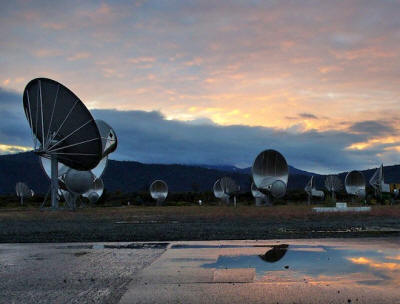Wired: What does the field of
anthropology bring to thinking about space exploration and
SETI?
Kathryn Denning: Anthropologists are good at looking at
discourses, and the stories that people tell to structure their
lives and their behavior.
So there are anthropologists working
on the discourse surrounding interstellar flight. And
anthropologists have always worked on the phenomenon of UFO
abductions and
aliens on Earth and that sort of stuff.
With respect to SETI, one of the main contributions is just
grounding all of that speculation about other civilizations in
actual physical data. In terms of civilization or civilizations,
we only have one example - Earth.
And thereís a lot of data here, which has been very poorly mined
so far. If people are drawing generalizations about
civilizations elsewhere in the universe that donít even hold
here on Earth, then maybe we should throw them out.
Wired: What are some instances of wrong ideas about civilization
that get invoked in talking about extraterrestrials?
Denning: I think one good example is the variable of L, the
lifetime of civilizations, which dominates
the Drake equation.
[An estimate of the number of intelligent extraterrestrials that
could exist in our galaxy.]
The speculation on this has been frankly goofy sometimes. I mean
you can make up basically any value of L that you like and
justify it in some way. So people say we should try to use
Earthís data to look at it. We should ask what really does cause
civilizations to collapse or revert to a lower order of
complexity or technological regime.
And, well, weíre still working that one out actually. We have so
much work to do and I think thatís important for people to
understand that our models of civilization here on Earth are not
as solid as popular culture frequently assumes them to be.
Similarly, many people hold outdated ideas regarding scenarios
of contact. We have our iconic case studies, such as Columbus
landing in the Americas or Cortez and the Aztecs. But most of
those have been revamped with additional historical work in even
just the last 30 or 40 years.
So when I hear that standard model of Columbus or Cortez,
frankly I want to roll my eyes.
For example [Steven]
Hawking
says - interminably and repeatedly - that when Columbus showed
up in the Americas, well, that didnít turn out very well for the
Native Americans. And therefore we should similarly be worried
about trying to attract the attention of an alien civilization.
The problem is that it tends to misrepresent Earthís history.
These stories get invoked in models of contact with an alien
society, but itís a biased retelling of Earthís history and itís
usually not a very good one.
The underlying narrative there is that it went poorly for the
Native Americans because they were the inferior civilization.
And, by extension, it would go poorly for us because the other
party would be the superior civilization. But that simply wasnít
the case for the Native Americans.
One of the reasons I do the work I do is to try and have people
get the history a little bit straighter.
Wired: There is an
oft-heard narrative for alien contact: after
we find a signal, it would revolutionize everything, and
humanity would put aside their differences and come together as
one. How do you take that narrative as an anthropologist?
Denning: One way to read that, in the most general sense, is
that itís a narrative that makes us feel better.
One of the things that astronomy and space exploration in the
20th century has done is force us to confront the universe in a
way that we never did before. We had to start understanding
that, yeah, asteroids impact the earth and can wipe out a vast
proportion of life, and our planet is a fragile spaceship Earth.
I think this has given us this sort of kind of cosmic anxiety.
And it would make us feel a whole lot better if we had neighbors
and they were friendly and they could enlighten us.
One of the things that runs through the whole SETI discussion is
our problems with technology. There is an inherent assumption
that the equipment needed for communication across interstellar
space would necessarily evolve in tandem with weapons of mass
destruction.
Therefore any society that survived long enough to
make contact with us would have solved their technological
problems.
I think thatís a very hopeful take on it. These stories of
contact and what it would do for us, theyíve emerged in concert
with these anxieties about the universe and questions about our
technology.
I think in some way itís almost like a coping
mechanism.
Wired: In terms of space exploration, youíve said that itís like
weíre entering a new Space Age. Why do you say that and what
does it mean?
Denning: I think the biggest difference from the past is the
role of corporations. Obviously nation-states have always used
contractors, but theyíre now achieving a degree of independence
that is unprecedented.
When you have private companies that are planning on flying not
just to the moon but
also to Mars, thatís new and thatís
different. We donít have the government systems in place to deal
with that sort of stuff because the outer space treaty and all
our international agreements are geared toward nation states.
There are new legal discourses emerging but nothing moves as
fast as private enterprise. Itís been specifically set up to
move quickly, so nothing moves as fast as, say,
the X prize.
Wired: The 1950s/60s Space Age often invoked the rhetoric of
colonization or frontierism in thinking about their goals. How
do these ideas play out in modern space exploration?
Denning: The ideological stages of colonization are still well
underway. As soon as you have technology on another world, that
constitutes a de facto claim of some kind.
So, in a way,
everyone watching
Spirit and Opportunity are watching Mars
through these robotís eyes.
Thatís not just an interesting kind of little jaunt; itís a way
of making Mars not only human but also American. When youíre
naming features on other worlds after people here, these things
constitute claims.
For example,
NASA renamed the Mars Pathfinder lander the ďCarl
Sagan Memorial Station.Ē Any archeologist or anthropologist will
tell you that one of the most effective ways of colonizing
territory, at least ideologically, is through your dead.
Wired: Is there something youíd like to see as the narrative of
the new Space Age?
Denning: Iím going to borrow a term here from a scholar named
Bill Kramer. He spoke at the 100-Year Starship Conference and he
suggested that instead of boldly going, we humbly go.
To me that really encapsulates it.
Instead of getting out there
as quickly as possible and using the systems that we used here
on Earth, like extracting resources as quickly as possible in
order to fuel whatever it is that weíre trying to do.
What if we
went instead with a collaborative, conservationist stewardship
in mind?
What if instead of making messes that we donít know how to clean
up, what if we slowed down a little bit? Because the urgency is
manufactured.
I mean, I want to see space continue to be
explored. Itís cool, and thereís stuff out there that we would
like to know.
It doesnít have to be the answer to all of our needs. Sure, we
can harvest sunlight from solar arrays in orbit around the Earth
but thatís going to have its own technological problems and
geopolitical implications.
But the main problem with energy and resources here on Earth
isnít always that we donít have enough: itís that the
distribution is unequal, and simply harvesting more is not going
to resolve that. Chances are itís just going to continue to
increase inequity, and that doesnít work well for anyone.
I think what everybody should be learning is that these immense
disparities cause profound instabilities, which you have to
continue to have to deal with. So I just donít see it as the
answer.
Space colonization is held up as being the natural next stage in
our social evolution. Not only that, itís an absolute necessity
for the survival of the species. But if we are our own
existential threat, then how does that follow? Wherever we go,
there we are.
So the suggestion that ever increasing technology is the
solution to problems that have been created by our technology is
barking mad.
Wired: In some sense, we have a deterministic view of history
when it comes to space exploration: We will go from airplanes to
spaceships to conquering the galaxy. Where does that narrative
come from and what do you see as some of the downsides of it?
Denning: I think it comes from two places. One is a specific
version of history thatís quite progressivist and techno-philic.
Itís a version of history that says we just increase in our
energy consumption, we increase in our complexity and we
increase our goodness. It all ratchets up together, and itís a
kind of
Singularity argument.
But itís combined with this fundamentally apocalyptic view that
the current order of things will one day be superseded by
another. Thatís kind of a Judeo-Christian thing. And itís sort
of a funny coincidence that the future is up there [points
skyward]. In many popular space narratives, the heavens and
Heaven really swap out. It sounds pretty glib but itís so
frequently suggested that itís hard to dismiss.
The idea is that longevity - immortality, in fact - the future
and our destiny are all up there. And thereís simply no logical
reason that should be the case. We have no evidence suggesting
we can live anywhere for long periods of time other than on this
planet. In fact, the evidence is steadily accumulating thatís
itís going to be really hard to do anything else.
We have problems with bone loss and
blindness. Plus we have no
evidence that we can reproduce safely in space. These are fairly
big stumbling blocks and so this vision of a happy shiny future
in space, itís just so mythic.
Wired: Do you see that as changing, do you think people are
coming to understand the problems with the previous narratives?
Denning: I think some are and this is one of the glories of
humanity. But weíll always have a tremendous diversity of
opinion.
Youíre always going to have these people who think Heaven and
the heavens are interchangeable. And theyíre going to be looking
toward the stars for all kinds of religious or quasi-religious
purposes.
Then youíre going to have the extension of the planetary
protection mode of thinking. The people who are fundamentally
thinking about environmentalism and stewardship and inequity.
And then youíre going to have the people interested in
militarization, and so on.
Youíre always going to have this diversity of viewpoints, of
motivations, and behaviors, and I mean: Welcome to Earth.
Wired: You write in a paper (Ten
Thousand Revolutions - Conjectures About Civilizations) that someone in ďthe physical
sciences might say Ďaha, here you have X which, by analogy,
means that you must have Y, which means you have Z.íĒ On the
other hand, ďa scholar in the human sciences will often not
venture past X.Ē
Denning: Right, we rarely get as far as Z. Most of the time,
anthropology is not working as explicitly with a predictive
model, itís a much more descriptive model.
Wired: How do you see that difference between the physical and
social sciences play out in the SETI discourse?
Denning: I think thereís been a lot of interesting discussion
around the question of whether or not decipherment of an
extraterrestrial signal would be possible.
Anthropologists tend to assume the answer is, basically, no.
Unless youíre in direct contact, it would be very difficult to
establish enough common language. Whereas the physicists and
mathematicians tend to say, ĎWell all you need is math.í
And then the anthropologists laugh and it goes on. Maybe that
tells you more about the various disciplines than about whether
or not contact is possible, but thatís an entertaining and
interesting problem.
Wired: What do anthropologists say when they look at the
enterprise of SETI? That is, what does it say about us as humans
that we are searching for others like ourselves in the universe?
Denning: Itís an interesting question and you can look at it in
different ways. In one sense, its just the extension of a long
tradition on thinking about what might be out there, which has
just gone through a new technological manifestation.
Some people ask me: When did we first start thinking that there
might be extraterrestrial life? And my reply is: When did we
start thinking that there might not be?
The sky has always been very busy, and the default position has always been that itís
populated. That doesnít mean anything but that ideological
substrate has always been there.
Only 200 years ago, we thought there could be people on the
moon.
Then, we got a good look at the moon and saw, well thereís
no Lunarians there. And then there were the Martians - Lowell
and all that - and it wasnít very long ago, less than 100 years
ago. As our range of vision keeps on moving outwards, the aliens
keep on moving outwards too. And thatís one way you can look at
SETI; itís the logical trajectory of an idea thatís always been
around.
And, of course, you can look at it within
a religious framework.
Our 20th century western culture includes Christianity and
beings populating the Heavens. But anthropologically speaking, SETI also could be seen as being a reaction to the collapse of
traditional religion.
In a universe where youíre no longer expecting God to provide
the order, we are forced to ask: where is the order? Whereís the
sense to it all and what are we then a part of?


